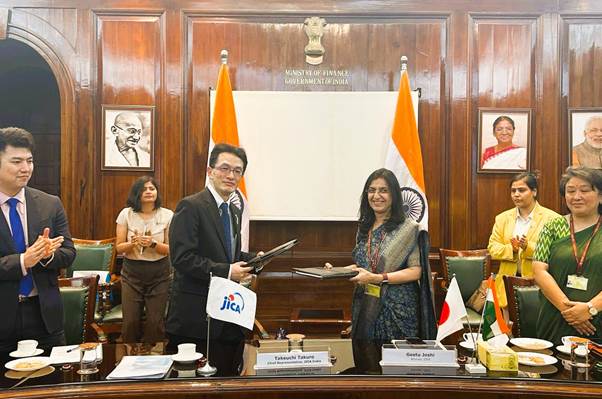
New Delhi: India and Japan today signed loan agreements worth 191.736 billion Japanese Yen (JPY) for six projects under Japan’s Official Development Assistance (ODA) to India. The projects are in the sectors of forest management, water supply, urban transport, aquaculture, biodiversity conservation and investment promotion.
The six loan agreements were established between the Government of India and the Japan International Cooperation Agency (JICA) to support various initiatives.
These agreements encompass the Tamil Nadu Investment Promotion Programme (Phase 3) or TNIPP-III, which is funded with Japanese Yen 36.114 billion, the Project for Capacity Enhancement for Effective Forest Management at JPY 8.280 billion, and the second phase of the Chennai Seawater Desalination Plant project, allocated JPY 52.556 billion.
Furthermore, the agreements include the Delhi Mass Rapid Transport System Project (Phase 4 Additional Corridors) with a budget of Japanese Yen 79.726 billion, the Assam State Aquaculture Promotion and Livelihood Improvement Project at JPY 3.580 billion, and the Punjab Biodiversity and Natural Resources Conservation Project, which has a funding of JPY 11.480 billion.
The TNIPP-III initiative aims to generate quality job opportunities for the youth by attracting both domestic and international investments sustainably and inclusively, while also promoting the growth of emerging sectors and enhancing advanced manufacturing skills within the workforce.
The Chennai Desalination Plant project is focused on providing a reliable and safe water supply through the establishment of a seawater desalination facility and its related infrastructure, ultimately aiming to elevate the living standards of residents, particularly those from disadvantaged backgrounds, and to create a more favorable investment environment in the Chennai Metropolitan Area.
The Project for Capacity Enhancement for Effective Forest Management is designed to bolster the skills of forest personnel in executing forest policies. This will be achieved through research and development initiatives, the execution of pilot projects, enhancements to training systems, and the fortification of institutions focused on forest conservation, biodiversity, and climate change.
Building on the ongoing support from JICA, the Delhi Metro Rail project is set to expand the mass rapid transit system, fostering regional economic growth while also addressing climate change by alleviating traffic congestion and reducing vehicle emissions.
In Assam, the aquaculture promotion initiative aims to boost aquaculture production and enhance the livelihoods of those involved in fisheries. This will be accomplished by promoting aquaculture practices, improving the fisheries supply chain, and strengthening the fisheries department’s institutional framework.
The biodiversity project in Punjab seeks to improve ecosystem services and lessen the effects of climate change by increasing tree cover outside of forests, conserving biodiversity, managing wetlands in an integrated manner, enhancing livelihoods, and reinforcing institutional capacities.
Since 1958, India and Japan have enjoyed a long-standing and productive partnership in bilateral development cooperation. Economic collaboration, a cornerstone of India-Japan relations, has seen significant advancement in recent years, further solidifying and enhancing the Strategic and Global Partnership between the two nations.
– global bihari bureau





